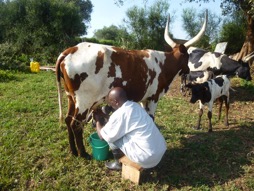On June 1st I flew into Entebbe Airport, Uganda and one day later I made my way down to Kacheera Camp by Lake Mburo. I immediately fell in love with the beautiful location of the camp and the lush greenness of the land! I was made to feel very at home by Iddy, Nathan, baby Natasha, Juliana, Salongo and everyone else at the camp and started to prepare for the next 6 weeks.
Unlike many visitors to Kacheera Camp I hadn’t been drawn there by a particular interest in conservation, wildlife, birding or even to relax by lake. I had contacted camp founder, Iddy Farmer, in the hope of finding a placement where I could do some work experience related to my interests in International Development and Primary Education. I was in luck! Iddy has a close relationship with the local primary school, St. Steven’s Model School, the Director of which is her brother-in-law. She arranged for me to spend 6 weeks volunteering with them teaching English and doing various school administration tasks.
St. Steven’s Model School is a private primary school with classes P1-7, as well as 3 nursery classes. Despite being funded by the students’ school fees, the school has in the past been largely dependent on donations and funding from a couple of NGOs and private sponsors from the US and Europe, especially for large projects such as new classrooms. My work, besides teaching English lessons for the P5-P7 classes (the school was missing but advertising for a new English teacher when I arrived) was to regularly update these school sponsors on news from the school and the students. These communications, although crucial to the school receiving continued, and securing future, support projects from the donors were occurring in only a verylimited fashion before I arrived and this was causing some tensions between the school and its supporters. In order to make the work I had been doing sustainable and to continue benefitting the school after my placement ended, I created a Communications Plan and worked with one of the teachers to practise sending these updates in the hope that regular updates would continue to be sent to the sponsors after I left.
There are also 10 students at the school who are ‘sponsored’ and therefore their school fees are paid by individuals in the US. Part of my work was to work closely with these children to collect and send information about their schoolwork, hobbies, exam results etc. to the NGO which ran the sponsorship scheme in order for this information to be passed onto the sponsors. Providing regular information to the sponsors was crucial for these children to continue having their school fees paid and being able to attend the school.
My role as an English teacher for the oldest classes, however, was the work that consumed most of my time. With over a year’s experience of English teaching behind me, the teaching itself wasn’t a challenge, especially as the children were extremely well-behaved and would, almost without exception, sit quietly and do the work instructed. What was frustrating however, was working with the Ugandan curriculum which expected children to learn English as a second language through only rote-learning and copying from the blackboard. It was, in my opinion, inadequate in many ways. The children were not, through this system, developing good reading skills or spoken English, nor were they learning to think in a creative or critical way! In my time there I tried to inject some creativity into the curriculum, whilst adhering to it closely enough for the children to learn what they needed in order to pass their exams. We did some creative project work, short story writing and tried to make time each week to read the story books that had been donated to the school. Sadly however I know that this will not continue after I leave, the deficiencies lie within the Ugandan Curriculum and teaching system and thus it is from here that changes need to be made.
When I wasn’t at school during the week I was staying with a local family, the parents and nephew and niece of Steven, the director of the school. I was able to learn about the local way of life (livelihoods supported by cattle farming) and some of the local language, Runyankole. I was able to learn about the struggles local families face and some of the ways they find to overcome them. In the International Development line of work understanding the local culture and way of life are very important for implementing appropriate projects, systems and technologies. This made my experience of staying with a Ugandan family particularly valuable. At the weekends I would return to Kacheera camp to relax (watch the football World Cup) and help out with some work there; painting and completing the Main Area building! It was the perfect setup!

I have returned to Scotland now and already I am missing the school, the camp and all the lovely people I met! I am excited to return at some point and see more of this beautiful country.
Thank you Iddy and Kacheera Camp!





